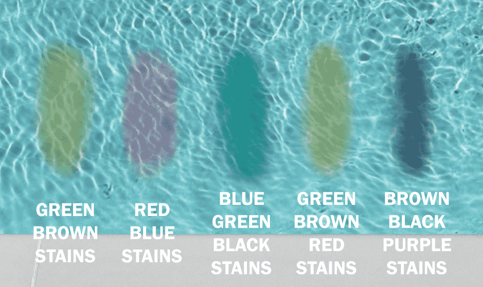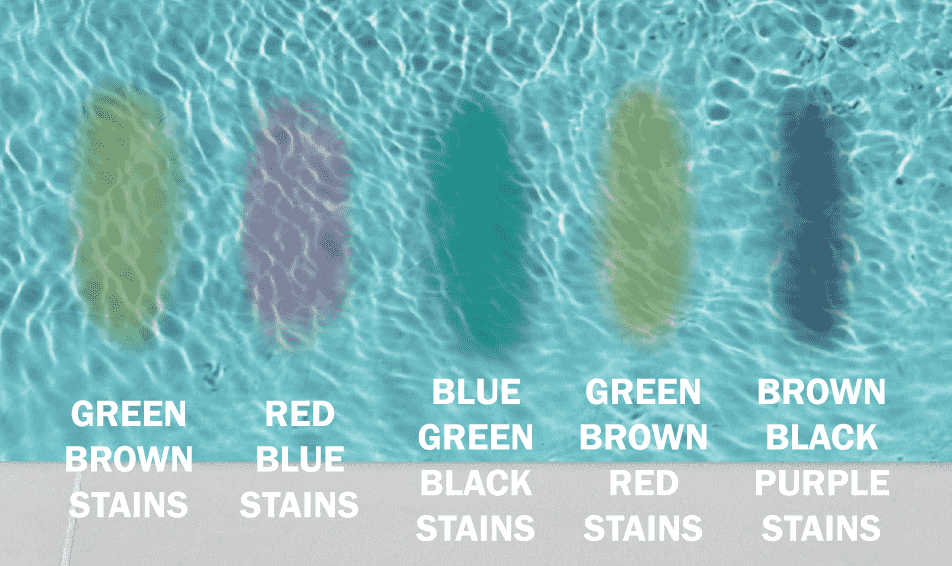How To Remove Organic and Metal Pool Stains
Removing pool stains can be tricky, particularly metal stains. All is well with the world and then one day you notice a stain on the bottom of your pool that wasn't there yesterday. If your automatic cleaner or the pool cleaning fairy can't scrub the stain off, what can you do to remove the stain? Read on to become a qualified Stainologist, know how to tackle the problem and prevent a recurrence.
Pool stains can be from a number of sources, even if your water is crystal clear and perfectly balanced. First up is to identify what is causing the stain. This is usually from organic matter or metals in your pool water.
Organic matter is most often leaves, berries and any other organic material that starts decaying and creates a stain if left for too long on your pool surface.
Metals can be present in your water supply or be a metal object that finds its way into your pool like a screw, metal filings or a flake of rust from a gutter etc. The most common culprits are helpful friends dropping beer lids into your pool (yes I know, it's really funny at 1am after a few drinks) and kids hair pins falling out while swimming (amazingly it seems that my daughters have never used a hair pin in their life when finding them on the bottom of the pool. I've had a lot of late nights waiting up to catch the Hair Pin Fairy throwing pins into our pool!).
How can you tell which type of stain you have? The colour of the stain is usually a pretty good indicator. Compare your stain colour to the image below to see what type you might have and more importantly, the type of stain remover you will need to say "bye bye" to the stain.

Greenish-Brown Stains (organic):
These are most likely organic stains caused by leaves or other plant matter.
Reddish-Blue Stains (organic):
These are more than likely from brightly coloured berries. If you have berry-bearing trees or bushes near the pool, they’re the most likely cause.
Blueish-Greenish-Black Stains (organic/metal):
These could be caused by organic matter like leaves or berries. However, if there’s nothing like that around your pool, a likely cause is copper which can be present in bore and dam water. Or, if you have corroded copper drinking water pipes anywhere in your house, this can also cause stains from topping up your pool water using your garden hose. If you have a heat pump, the heat exchanger is often made from copper. If your water balance is continuously low in pH and high in chlorine, the heat exchanger can start to corrode (and you'll void your heat exchanger warranty) causing copper stains.
Greenish-Brownish-Red Stains (metal):
This combination is an indication of iron in the water. If you fill your pool with bore or dam water, it’s likely that it contains iron. Aside from the common culprits mentioned in the intro, perhaps you have metal somewhere in your pool area, such as a fence or a roof gutter. If any metal in your pool area is rusting, rain can wash rust into your pool causing a stain. Or, someone might have accidently dropped a screw or metal filings into your pool when working.
Brownish-Blackish-Purple Stains (metal):
This dark colour combination is caused by manganese. This naturally occurring metal is present in bore water, however can also be found in town water supplies. The town water is treated to reduce the amount of manganese however it’s not completely removed.
How To Remove Organic Pool Stains:
Chlorine is most often the go to for organic pool stains. If stains are forming, it usually means your chlorine level is too low and you need to shock treat (twice the usual daily amount of chlorine) your pool water. Below is a step by step guide to help you remove organic pool stains:
1. Test and balance the pool water: Ensure alkalinity is between 100ppm and 150ppm and the pH is between 7.4 and 7.6.
2. Shock the pool: buy a liquid or granular chlorine and follow the instructions on the product packaging.
3. Manually brush down the pool walls and floor (yep, even if you have the Star Trek level robot with 18 scrubbing brushes).
4. Run the pump overnight. Shocking your pool overnight prevents UV light from the sun during the day reducing the effectiveness of the chlorine.
5. Manually brush down the pool again for best results (yep, still can't use your robot).
6. Check the stains have disappeared. If not, repeat the process.
7. Stains still present? Time for the big guns. Put a small amount of granular chlorine into a stocking and put the ball of chlorine directly on top of the stain for 1 to 6 hours. Be careful to check if the stain has been removed every hour to prevent bleaching the pool surface.
8. If the stains are still present following these steps, the stain may be metal rather than organic.
How To Remove Metal Pool Stains:
Metal stains can be more stubborn to remove and you may need to try several stain remover products to get the job done.
Below is a step by step guide to help you remove metal pool stains:
1. Go to your local pool shop and ask them to test your water for metals. Even if you know what has caused the stain, have your water tested as there might be more than one type of metal in your water.
2. The pool shop will be able to recommend a pool stain remover that is designed to treat the specific type of metal in your pool.
3. Follow the instructions on the product packaging as each stain remover will require a different process.
Preventing Pool Stains:
Prevention is definitely a lot easier and cheaper than treating a stain. The following tips won't guarantee a stain free pool however your chance of having to treat a stain will be on the low side.
How to Prevent Organic Pool Stains:
1. Keep your pool water balanced at all times, especially the alkalinity, pH, and sanitiser (chlorine) levels.
2. Keep your pool clean by using an automatic pool cleaner with a scrubbing function or by manually vacuuming and brooming your pool weekly.
3. If a scorched earth policy of clearing any tree or shrub within 1km of your pool is not possible, manually skim the pool surface often. This keeps leaves, twigs, and other organic debris from sinking to and settling on the bottom of the pool where they can stain.
4. If you plan to do pool landscaping, make sure you plant fruit-bearing trees and shrubs outside of the pool area. If you have existing plants that drop fruit, keep them trimmed or move them away from the pool area as far as possible.
5. Check the pool regularly for stains. The sooner you find them, the easier it is to remove them. Us humans tend to avoid our pool like the plaque in winter which is when higher winds and storms are blowing organic and metal materials around. We test our pool water less frequently and often discover on the first day of spring that our pH has been too high or too low for months. Inspect your pool weekly as a metal stain that has been in place for three months will be trickier to remove than a week old stain.
How to Prevent Metal Pool Stains:
1. Test your water source for metals. If they’re present, use a hose filter when filling or refilling your pool. Other options are banning friends who drink beer from coming over and insisting your daughters have to have a crew cut if they want to swim in the pool.
2. Use a metal sequestrant in your pool. This chemical binds with metal particles to keep them from settling on pool surfaces, and to make it possible for them to be removed by the pool filter.
3. Maintain your metal surfaces near your pool area like fence posts, gutters, sheds etc to prevent them rusting.
4. Keep the pH level in your pool balanced, especially if you have copper in your water or a heat pump with a copper heat exchanger. Low pH makes the water acidic, which will corrode and eventually oxidise the copper, causing stains.
Related Blogs
When it comes to backyard swimming pools, fibreglass options often come out on top. They are fast to install, low maintenance, and last for decades. But are they perfect for everyone? Not necessarily.
Thinking about joining the world of fibreglass pools? You might feel like you’ve stumbled into a whole new language of coping, skimmers, gelcoats... What the heck does it all mean?
Thinking about installing your own fibreglass pool in New South Wales? Good on you — done right, DIY pools can save you serious money without cutting quality and still look like a pro job. But....
About The Author
My wife and I grew up playing in swimming pools. Our daughters learnt to swim in our backyard fibreglass swimming pool. There is nothing quite like hearing kids splashing about and giggling. As pools do, our pool became a social magnet for friends, family and neighbours which we loved. Helping customers to have their own pool and saving customers thousands on their pool and equipment is the best job in the world.























